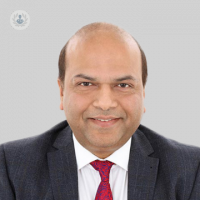All about salivary gland surgery
Written in association with:Salivary gland surgery is a procedure to remove the salivary glands, which produce saliva in our body and consist of four major (two parotid and two submandibular glands) and numerous minor salivary glands. There are some problems that may arise in the glands, necessitating their removal. In this article, Mr Anurag Jain, a surgeon specialising in otolaryngology (the ears, nose, and throat) provides insight into this surgical procedure.

What are the indications for salivary gland surgery?
Salivary glands may develop a lump in them which needs to be removed to confirm diagnosis as well as to ensure that the lump does not turn cancerous. Salivary glands can also develop stones in them or in the duct that drains saliva into the mouth which can get frequent pains and swelling with infection in relation to the meals. If this does not resolve spontaneously, either the stone itself or sometimes the whole salivary gland may have to be removed.
What are the risks and complications of salivary gland surgery?
Besides the risks of general anaesthesia and general risks of surgery for example, bleeding, infection and scarring, there can be specific risks for example risk of damage to facial nerve or its branches which may be temporary or permanent or total or partial. Saliva can also collect or drain forming a fistula following salivary gland surgery. Any tumours which are removed can recur requiring potentially a revision surgery. These risks are rare as great care and precautions are taken during this procedure with the use of a nerve monitor and probe to identify and preserve the facial nerve and its branches.
What is the recovery time for salivary gland surgery?
Two to three weeks recovery for which a medical certificate is provided. Although if you are feeling up to it, you can work from home after the first week.
What are the alternatives to salivary gland surgery?
A lump in the salivary gland usually will require a surgical excision if it is symptomatic or for confirmation of diagnosis. Depending on a type of lump, they can also be observed with conservative management. For stones in the salivary gland or its duct, conservative measures for example drinking lots of water, massaging over the gland, and sucking lemons after meals may be tried in case of small stones which are not very symptomatic. There are other options for example endoscopy of the salivary gland duct with stone retrieval by a Dormia basket, or lithotripsy which gives out shock waves to crush the stone which may then flush out naturally. These two techniques are typically used to manage kidney stones and are available only in limited places.
Who is a good candidate for salivary gland surgery?
A patient with good general health without significant underlying illnesses or any other risk factors – for example, being on blood thinners, which may cause bleeding during or following surgery – can be considered for salivary gland surgery. Of course, in cases, where there is a suspicion of cancer, even high-risk patients are considered for surgery with adequate pre operative assessment and optimization.
If you believe you had salivary gland stones and would like to consult with a specialist, you can book an appointment with Mr Jain via his Top Doctors profile.


